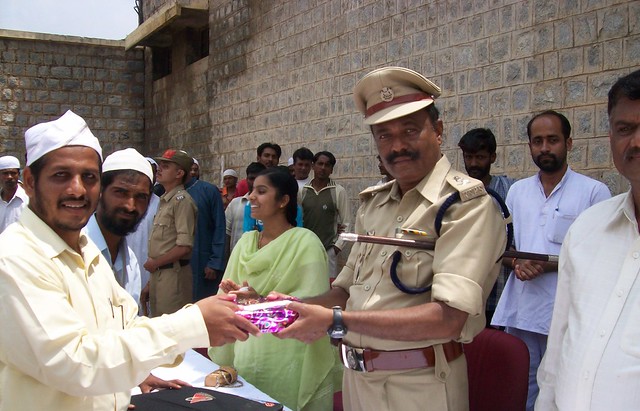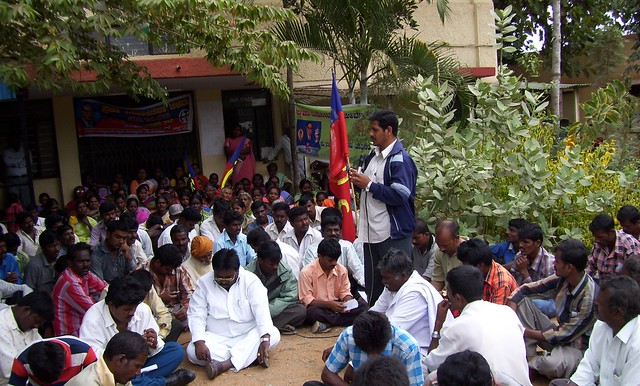By Shaik Zakeer, TwoCircles.net,
Banglore: At the end of 1980, when the Iran-Iraq war came to a halt, there was a growing illusion in many youths that the aftermath of the decade old conflict, would open gates of economic prosperity for them. Many were highly qualified engineers; some were electricians, plumbers, mechanics, technicians and people from all types of workforce. “So they started applying for passports and visas,” says Faiz Akram Pasha.
But this enthusiasm, which was mostly found in Muslim youths, did not go unnoticed by the intelligence agencies of the country; many of them were questioned. “They wanted to know, why, when everyone else were returning from these countries because of the raging conflict, these youths wanted to go there. They thought they had the intention to fight there.” says Faiz. And when their answers did not satisfy the interrogating officers, they were detained. “Four of them, were my friends,” he says.

When his friends were eventually released, it had been only after four years of imprisonment. Four years of darkness, four years of ruin, four years of madness. “It took them that long to find out, that they were innocent,” he recalls the event with sadness. Determined to get them justice, he took his friends to meet the then commissioner of police. “While we were waiting in his office, there was another police officer, who walked pass us. He then called us to his chamber and inquired the reason of our visit,” says Faiz.
After listening to their tale of anguish, the ex-DIG (Prisons) late B. S. Abbai, told the indignant youths, that what had happened to them, was not an aberration, but something that a lot of people go through. He then asked, if they were willing to take up the task of fighting for the rights, of people, who had become the victims of that very system and circumstances, that they were the sufferers of. Faiz says he agreed to it unflinchingly.
Shuttered Door
Behind the walls of Bangalore’s central prison, there are scores of harrowing tales of despair and helplessness. While many are lodged there, for some obvious reasons, there are however, those who have fallen prey to a brutal and an apathetic system, which has turned a deaf ear to their cases. Faiz pulls out a photo album of such cases from his bag, to show me, the pictures of inmates and their families, and starts narrating their stories one after the other. There is a picture of a mother and her three toddlers, who were motionless, when it was snapped. The mother had apparently, killed her children and then committed suicide, because she could no longer feed them. Her husband, he says was serving a 2 year term in prison, because of a petty crime. “Usually, if you pay a fine, you are set free, but because the family couldn’t afford that amount, he was still behind bars.”
Then there is a picture of a group of migrant workers, who had served an unfathomable 4 years, behind those walls, because they were caught travelling in a train without tickets. There are pickpockets, men who had been holed up, because of offence committed in a fit of rage, political activists, who were wrongly sentenced, because of the rigged up evidences, produced by their highly influential opponents.
“Many of them are not habitual offenders or hard-core criminals, in fact, there have been cases I have come across, where the accused were not even aware, what they did were a crime,” he says. According to him, most people lack basic knowledge of criminal offences in this country, because of which they end up spending years behind bars.

Hope
Faiz Akram Pasha is the founder and secretary of Janasadbhawana, an organisation which is on a mission to rehabilitate and re-integrate prisoners in order to promote a peaceful society, whilst advocating for justice in prisons. Though Faiz himself has been working for this cause since his days in college, he founded his NGO in 2006, at the insistence of B. S. Abbai, who he refers to as his mentor. Since its inception, he and his group of volunteers have helped the release and rehabilitation of over 450 inmates, by paying their pending fine amount and in some cases, also finding them jobs.
According to him, a lot of his volunteers are former inmates, who, after speaking to Faiz and realizing, what they did was socially unacceptable were ready to shred their criminal pasts and lead a life of purpose. “Because they are inmates, they realize the difficulties one faces inside the jail, so they want to help others to get a better direction in life,” he says.
It is with the assistance of these volunteers, that he is able to identify those, who he thinks should be released and be rehabilitated. “We first go through their case and then talk to them,” it is easy to comprehend the mind of a person, Faiz says, and “after couple of sessions with them, we understand, the reason they have committed the offence is because of the immense social and family pressure they are in or due to some unfortunate circumstance, they find themselves in,” he says. He provides them counsel and talks them out of the idea that, indulging in such activities will not solve their problems, but only increase it.
“What these people need, is someone from the outside world to pull them out, and if someone is ready to do that, then there are many who are ready to correct themselves.” But the problem Faiz says is, not many want to get involved. In fact, Janasadbhawana is the only organisation, which is officially recognized and permitted to conduct their activities by the Karnataka-Prisons department. “We have the co-operation of every prison in Karnataka,” he says.
Though he is not backed by large funders, his activity has not slowed down. There are times, when he has got inmates to his house for temporary shelter and times, when he has failed to pay his rent to get prisoners released, but does his family ever complaints? “Yes it makes us uncomfortable, yes there are lot of challenges, but we have learnt to live by it, as his work demands it,” says Faiz’s elder sister, who along with his wife and other members of his family have stood by him.
To put a stop to crime, is not just the responsibility of the police, but is a collective effort, where even ordinary citizens should be involved, Faiz believes. And to bring that conscience into public mind, he and his team are currently engaged in creating awareness among school students and general public. His ‘Safe India Movement’ is his dream for a safe and crime free country.
Faiz was recently honoured for his with Dr. Mumtaz Ahmed Khan Award by the Al-Ameen Educational Society.
Note: If you want to help Faiz and his organisation, either financially or to volunteer, you can contact him on +91 93411 18747, or [email protected] .

